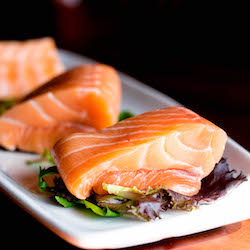Which Omega-3 source may have better cancer fighting properties, fish or plants? A new study from University of Guelph, Ontario shows that Omega-3s from fish and other marine sources are far superior to flax. The lead researcher, Prof. David Ma, discovered that marine-based omega-3s are eight times more effective at inhibiting tumor development and growth than from plant sources. Omega-3 from marine sources “pack a stronger punch than flaxseed and other oils when it comes to cancer prevention,” according to a statement from the University.
 “This study is the first to compare the cancer-fighting potency of plant-versus marine-derived omega-3s on breast tumor development,” said the professor in the Department of Human Health and Nutritional Sciences. “There is evidence that both omega-3s from plants and marine sources are protective against cancer, and we wanted to determine which form is more effective.”
“This study is the first to compare the cancer-fighting potency of plant-versus marine-derived omega-3s on breast tumor development,” said the professor in the Department of Human Health and Nutritional Sciences. “There is evidence that both omega-3s from plants and marine sources are protective against cancer, and we wanted to determine which form is more effective.”
Published in the Journal of Nutritional Biochemistry, the study involved feeding the different types of omega-3s to mice with a highly aggressive form of HER-2 human breast cancer. HER-2 affects 25 per cent of women and has a poor prognosis.
Prof. David Ma exposed the mice to either the plant-based or the marine-based omega-3s, beginning in utero.
The mice were exposed to the different omega-3s even before tumors developed, which allowed us to compare how effective the fatty acids are at prevention,” said Ma. “It’s known that EPA and DHA can inhibit breast tumor growth, but no one has looked directly at how effective these omega-3s are compared to ALA (α-linolenic acid).”
Why is Fish Omega-3 Superior to Flax and other ALA Omegas?
Ma found overall exposure to marine-based omega-3s reduced the size of the tumours by 60 to 70 per cent and the number of tumours by 30 per cent. However, higher doses of the plant-based fatty acid were required to deliver the same impact as the marine-based omega-3s.
ABSTRACT:
The objective of this study was to examine the effect of lifelong exposure to plant- or marine-derived n-3 PUFA on pubertal mammary gland and tumor development in MMTV-neu(ndl)-YD5 mice. It is hypothesized that lifelong exposure to n-3 PUFA reduces terminal end buds during puberty leading to delayed tumor onset, volume and multiplicity. It is further hypothesized that plant-derived n-3 PUFA will exert dose-dependent effects. Harems of MMTV-FVB males were bred with wild-type females and fed either a 1) 10% safflower (10% SF, n-6 PUFA, control), 2) 10% flaxseed (10% FS), 3) 7% safflower plus 3% flaxseed (3% FS), or 4) 7% safflower plus 3% menhaden (3% FO) diet. Female offspring were maintained on parental diets.
Compared to SF, 10% FS and 3% FO reduced (p<0.05) terminal end buds at 6 weeks and tumor volume and multiplicity at 20 weeks. A dose-dependent reduction of tumor volume and multiplicity was observed in mice fed 3% and 10% FS. Anti-tumorigenic effects were associated with altered HER2, pHER-2, pAkt and Ki-67 protein expression. Compared to 10% SF, 3% FO significantly down-regulated expression of genes involved in eicosanoid synthesis and inflammation. From this, it can be estimated that ALA was 1/8 as potent as EPA+DHA. Thus, marine-derived n-3 PUFA have greater potency versus plant-based n-3 PUFA.
Ma explained in a statement that Omega-3s prevent and fight cancer by turning on genes associated with the immune system and blocking tumour growth pathways. “It seems EPA and DHA are more effective at this. In North America, we don’t get enough omega-3s from seafood, so there lies an opportunity to improve our diet and help prevent the risk of breast cancer.”
Based on the doses given in the study, Ma said, humans should consume two to three servings of fish a week to have the same effect. Besides certain foods containing EPA and DHA, supplements and functional foods, such as omega-3 eggs or DHA milk, can offer similar cancer prevention effects, he added.
The next step is to investigate the effects of omega-3s on other forms of breast cancer. “Seeing the significant benefits omega-3s can have in combating a highly aggressive form of breast cancer means omega-3s will likely be beneficial for other types of cancer.”





